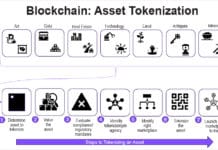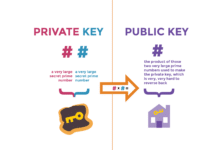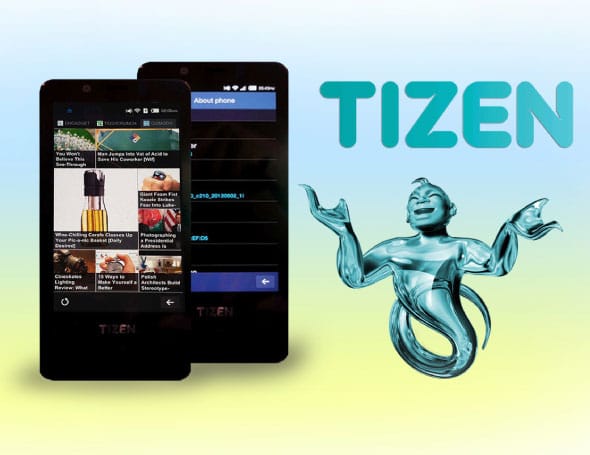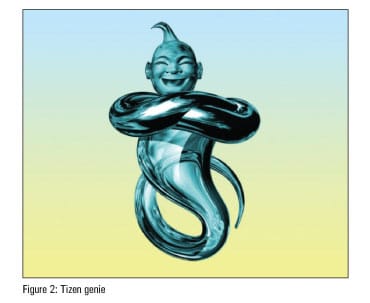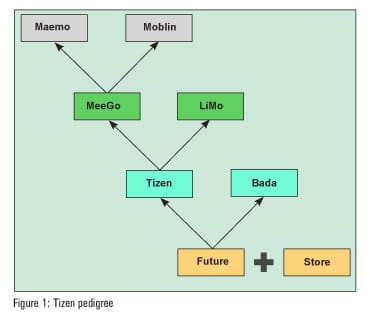A recent spike in the development of open mobile OSs has led to the release of exotic sounding distributions. An OS that is yet to grab the headlines is one that is mobile-optimised and will begin appearing in mass produced handsets starting this year, according to Samsung. Tizen is the OS in question, and its developers intend it to power a variety of devices including phones and, eventually, tablets, vehicles and televisions.
The Tizen operating system succeeds a number of other mobile-optimised OSs, which for one reason or another have had their cores or certain components migrated or merged into it. The first release of the Tizen SDK 1.0, code named Larkspur, came on the heels of Meego’s decommissioning, and integrated large parts of LiMo as well. It featured a DPKG-based software packaging system, the Linux kernel, Enlightenment Foundation Libraries (EFL) for graphics, and a number of components for connectivity and other features.
The Tizen 1.0 mascot was a friendly smiling genie, and this SDK release was timed to appear at the time of the first annual Tizen developer conference in San Francisco on May 7-9, 2012. By the time the Tizen SDK 2.0 came out, the genie was gone and replaced with the new Tizen ‘pinwheel’ logo.
Mobile contenders
A number of open source mobile-optimised operating systems have recently appeared, and some are already installed on hardware that’s in production and are selling rather well. The list includes Firefox OS, Ubuntu Touch, and Jolla Sailfish. The strategies of these contenders seem to indicate a healthy open source-based mobile ecosystem, but whether their futures lie in niche markets or something bigger is yet to be seen.
Comparing Tizen with these contenders is a difficult task, as some are rather unstable and most are undergoing heavy development. The first Tizen characteristics that come to mind are that it:
- Offers the least liberal licence (Flora)
- Supports both Web and native frameworks
- Provides graphics primitives using EFL
- Is supported by large manufacturers
Future developments
Best described by Alan Kay’s words ‘The best way to predict the future is to invent it,’ Tizen developers are working towards a number of innovative goals. Along with Intel and Samsung employees, independent engineers are implementing transports, stores, and of course, applications. They’re correcting API inadequacies (in important technologies like NFC and orientation), and communicating on a personal level at developer conferences and smaller meet ups. Information gained from the recent Tizen developer conference in San Francisco indicates both a broad and deep level of progress in the Tizen ecosystem. Speakers informed the audience about the latest decisions and developments like the Tizen Store, spoke on manufacturing of devices, and Bada migration (or integration).
Future challenges
Unfortunately, the interests of Tizen and Bada diverge and, yet, these two are set to collide, if Samsung’s announcement of ‘merging’ Bada into Tizen is anything to go by. If Tizen’s direction veers off course once Bada integration is under way, a number of unexpected (some quite negative) events could set back Tizen’s already ‘at risk’ pace of innovation, Tizen insiders say.
To avoid a falling out with developers and users alike, there is a good deal of work to be done. Managers nearly lost Tizen a good amount of friendly help from independent developers by considering closing off application side loading, the process in which developers and advanced users directly install applications onto Tizen devices. While Tizen is safe for the moment from such ‘walled garden’ deployment restrictions, only time will tell if such ‘shots in the foot’ (from a Linux perspective) lame or even kill the project.
So what are Tizen’s chances of a prime time smartphone entry? Will Tizen take a bite out of Apple’s and Google’s comfortable market share?
Will the genie be put back into the bottle by Bada, and will Samsung open its top down secretive Tizen management style?
Only the genie knows, and he’s not talking.


























